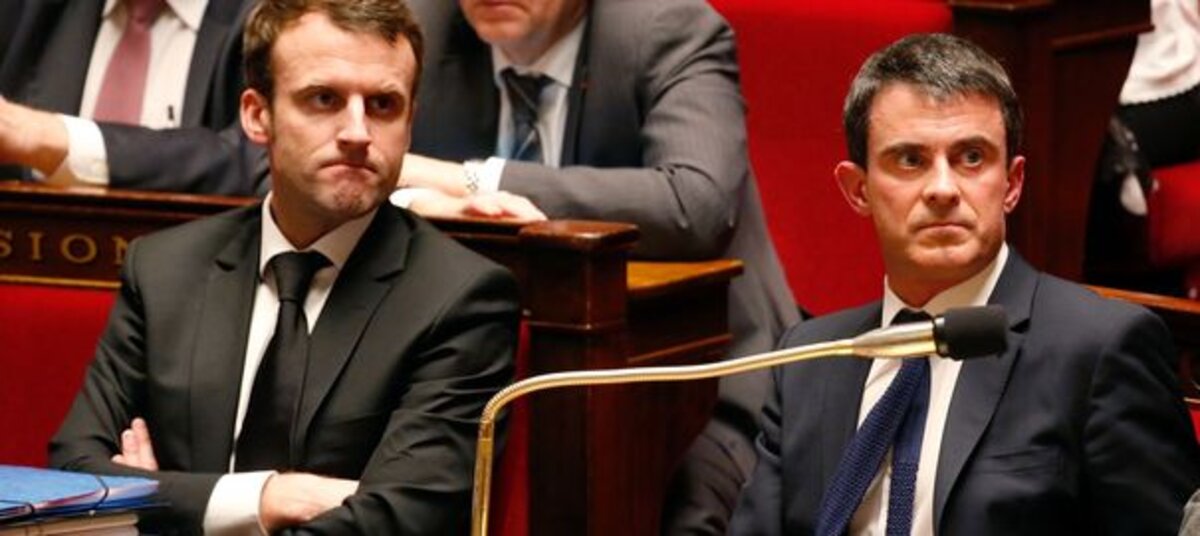It is the political symbol of the authoritarianism of the weak. The use of Article 49-3 is one of those constitutional weapons that exist in no other parliamentary democracy. But it is a double-edged sword. While it allows for forcing things through by sweeping away parliamentary consultation, it also represents a formidable admission that the government which uses it no longer has a parliamentary majority, and therefore no political majority.
By making this choice, to impose onto legislation the bill of law of a young technocrat- banker called Emmanuel Macron whose only political legitimacy is that of having been a presidential economics advisor, Manuel Valls knows that he is engaging President François Hollande’s five-year term of office in a new adventure.

Enlargement : Illustration 1

Leaning on the institutions of the Fifth Republic, as did also Dominique de Villepin regent of the end of Jacques Chirac’s reign, the government of Manuel Valls has definitively raised anchor, ridding itself of all requirements to build political agreements, rallying or negotiations. By using this weapon, he has renounced all the criticism voiced for years by socialists against this “parliamentary gag” which the executive powers have at their disposal.
Welcome then to the worst of the Fifth Republic, to this fortress whose drawbridges are now raised, and which now offers the only certitude of that of being able to cling on until the next elections. The system, certainly, can carry on; the president presides, the prime minister governs and Manuel Valls does his Manuel Valls, in the name of a so-called “general public interest” to which he has decreed himself to be the unique guarantor. While all of this is far, so very far, from society and the political forces that brought them to power.
Freed from any mandate, from any pledge, and overplaying the card of authority in order to better disguise what is a vacuum, this solitary inebriation can be pursued for a while, accompanied by a few empty slogans, as used by the prime minister on Tuesday – “the interests of the French people”, “the need for reform” and “we’re assuming our responsibilities”. But in general, these boastful phrases eventually lead to a hangover, complete with an electoral debacle.
The government knows this of course, aware as it is of past disasters brought upon those who use this parliamentary wet blanket. But Manuel Valls as much as François Hollande regard themselves as authorized to take this risk, one that they would undoubtedly not have taken just a few months ago. Because it is plainly a political context that has changed, one in which the government believes it is able to build the means of saving itself from defeat in the presidential and parliamentary elections due in 2017.
This context has a name: it is the much championed ‘spirit of January 11th’ which was born, it is said, with the huge mobilizations of citizens in rallies and marches that Sunday following the January terrorist attacks in Paris . From this awakening of society and the country two conclusions could be drawn, and two approaches taken. One of the latter is that the government opens itself up to society, mend broken links, demonstrate that it is attentive to the gaps within the country, to its blind spots, that it innovates regarding social policies.
But the government took the second choice. That of speeding up and forcing its way through, which, masked by the typical ploy of supposedly addressing the French people directly, allows it to eliminate every intermediary that represent the political parties, trades unions, parliament and its own ruling majority.
Manuel Valls clearly indicated this in his comments in parliament and the media earlier this week, when he spoke in the trademark tone he has adopted of a strong prime minister who knows how to exert his authority and speak his mind. Valls is hard on the heels of Nicolas Sarkozy, who overdid this pretence, with the stupefying result that we are at war – because that’s what the prime minister wants. Because not content with simply smashing its parliamentary majority, the political executive is instilling the country with a guards parade atmosphere where calls for mobilization, like a call to ‘stand in line and raise the flag’, appear to be the new agenda.
What did Manuel Valls say on Monday morning in reaction to the Copenhagen attacks and the desecration of a Jewish cemetery in eastern France? He declared “war”. He insisted that there must now be a “war against Islamo-fascism, outside but also inside” the country, a fight against “jihad”. At the same time, “France’s Islam must assume [its role], totally take on its responsibilities, which is also in fact what the vast majority of our Muslim compatriots demand”.
'War on terror' and 'the spirit of January 11th'
By using the phrase “Islamo-fascism” Manuel Valls knew that he was borrowing one used the previous day by the conservative UMP party Member of Parliament (MP) and mayor of Nice, Christian Estrosi (who spoke of a “Third World War against Islamo-fascism”), and one which is regularly employed by neo-cons of all sorts (from Bernard-Henri Levy to Pascal Bruckner, not forgetting the inevitable Alain Finkielkraut) and those who liken secularism to a dogged sovereignty. By once again ordering “France’s Islam” to “take on its responsibilities” (and what are these?), he stamps suspicion upon the country’s second most popular religion.
This now unrestrained approach, an almost perfect copy of that voiced by US neo-cons after the September 11th 2001 attacks, is being put into practice. The sale earlier this month to Egypt of 24 Dassault Rafale fighter jets and a frigate (for a total of 5.4 billion euros) was not touted only as an economic success, but was presented as a foreign policy move. Both Valls and Hollande insisted on how Egypt was an “important actor for regional stability” and which should thus be offered support.
Not a word was mentioned about the dictatorial nature of the regime of Egyptian leader Abdel Fattah al-Sisi, which came to power in July 2013 after a military coup d’état that overthrew president Mohammad Morsi and his Muslim Brotherhood government. The ferocious repression, thousands of deaths, tens of thousands of imprisonments, the elimination of not only the Muslim Brotherhood but also all democratic movements have made Egypt into a dictatorship that has nothing to envy that of Hosni Mubarak.
This bloodbath in a country that is economically ruined does nothing to make Egypt, as the French president tries to pretend, a mediator or settler of crises in the Middle East. Quite the opposite. As Bernard Rougier, a leading academic expert on modern Egypt and director of the Cairo-based Centre d’Études et de Documentation Economiques, Juridiques et Sociales (Centre of Economic, Judicial and Social Studies and Documentation) told Mediapart in an interview earlier this month, “the [Egyptian] authorities exercise an indiscriminate repression, with a legislative arsenal that is becoming tougher” but that “Egypt will remain in a situation of instability, almost revolutionary. The current conditions render impossible the return to order”. So it is that France has chosen to deliver the most modern weapons to a country plunged into chaos.

Enlargement : Illustration 2

It is the same situation with Morocco, with whom France has recently restored its relations after a year of dispute, an event which was celebrated in a most uninhibited manner. Here again, the anti-terrorism cooperation between intelligence services is the justification given to forget the application of “Republican values” that are so regularly brandished by the French prime minister. Last Saturday, French interior minister Bernard Cazeneuve announced that Abdellatif Hammouchi, head of Morocco’s domestic intelligence service, was to be awarded the Légion d'honneur, France’s highest civil distinction. Thus the French government honours a man who is the target of three lawsuits in France for perpetrating torture and complicity in torture, and who an examining magistrate tried in vain to question one year ago.
The day after Cazeneuve’s announcement, two French journalists from the TV news agency Première Ligne who were working in Morocco on a documentary for the France 3 channel were arrested and immediately expelled from the country. According to the journalists, the French foreign ministry made it known to them that it would not intervene in the matter.
Engaged in two wars against “Jihadist barbarians”, in the African Sahel region and in Iraq, the French government has ceaselessly reinforced the military operations over the past two months. Debate about the aims of the operations and the political strategies to be deployed has been carefully locked down. Only conservative former prime minister Dominique de Villepin has denounced this blind approach. Speaking on French TV channel iTélé last week, he warned against the mistake that is “to make an amalgam, to identify Islam with these barbarian and odious acts, to have recourse to war-waging speech”, adding: “By using military means, we feed terrorism.”
Villepin no doubt recognises that he has become inaudible within his own conservative camp and amid the corridors of power. As in the US immediately after the 9/11 attacks, during the presidency of George W. Bush, the rhetoric of “the war on terrorism”, fuelled by the horror of the events, had the other advantage of silencing contestation, of dissuading any questioning, and of dismissing disagreement as irresponsible. In the same manner, the French government’s use of the 49-3 decree this week is a coherent declension before MPs of a warped interpretation of "the spirit of January 11th".
-------------------------
- The French version of this op-ed article can be found here.
English version by Graham Tearse
- Leer la opinión en español : El decretazo de Valls


